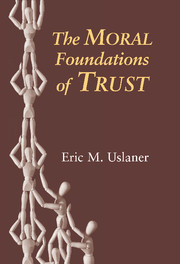Book contents
- Frontmatter
- Contents
- Preface
- 1 Trust and the Good Life
- 2 Strategic Trust and Moralistic Trust
- 3 Counting (on) Trust
- 4 The Roots of Trust
- 5 Trust and Experience
- 6 Stability and Change in Trust
- 7 Trust and Consequences
- 8 Trust and the Democratic Temperament
- Epilogue: Trust and the Civic Community
- Appendix A
- Appendix B
- Appendix C
- References
- Author Index
- Subject Index
2 - Strategic Trust and Moralistic Trust
Published online by Cambridge University Press: 12 January 2010
- Frontmatter
- Contents
- Preface
- 1 Trust and the Good Life
- 2 Strategic Trust and Moralistic Trust
- 3 Counting (on) Trust
- 4 The Roots of Trust
- 5 Trust and Experience
- 6 Stability and Change in Trust
- 7 Trust and Consequences
- 8 Trust and the Democratic Temperament
- Epilogue: Trust and the Civic Community
- Appendix A
- Appendix B
- Appendix C
- References
- Author Index
- Subject Index
Summary
It's not that I'm ignoring what's going on – well, I guess to a certain extent I do ignore it – but it's because I want to stay focused on the positive things I want to accomplish.
– Carol Erhard, a volunteer living in the Washington suburbs and a member of the Optimist Club.The Uslaner family regularly makes trips to the Delaware beaches and on the way from suburban Maryland there is a fruit stand that is only rarely staffed. Yet, there is usually fruit available for purchase on the honor system. You take what you want and put the money into a lock box. One of the customers I met seemed very impressed. He turned to others and said, “How trusting!” I bought my fruit, paid, and felt a bit warmer toward society. The owner said (on one of the infrequent occurrences I found him there) that people rarely betray him and take fruit without paying.
The fruit stand owner doesn't know who bought (or took) his fruit. He has had to presume that most people are trustworthy. Yes, he has some evidence. Clearly, if people routinely ripped him off he would have to close his stand when he couldn't be there himself. Yet, at some point, he was willing to take an initial gamble that “most people can be trusted.”
Perhaps the fruit stand owner might have relied upon personal experience rather than upon trust in strangers. Yet it would be foolish to extrapolate his experiences with close associates to people he has never met.
- Type
- Chapter
- Information
- The Moral Foundations of Trust , pp. 14 - 50Publisher: Cambridge University PressPrint publication year: 2002
- 5
- Cited by



